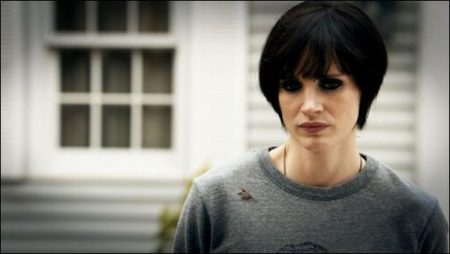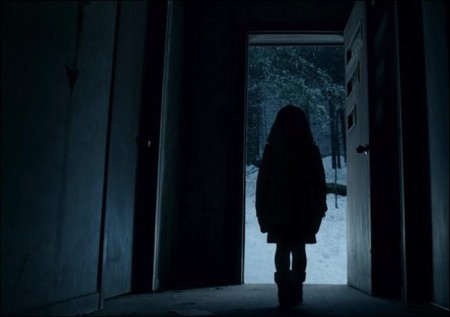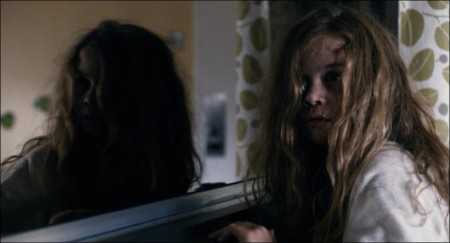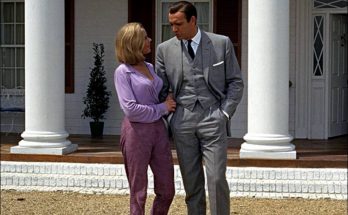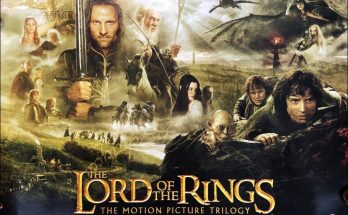Mama: A dark fable about disturbing questions. Two little girls disappear into the woods the day that their mother was murdered. When they are rescued years later and begin a new life, they find that someone or something still wants to come tuck them in at night.
The day their father killed their mother, sisters Victoria and Lilly vanished near their suburban neighborhood. For five long years, their Uncle Lucas and his girlfriend, Annabel, have been madly searching for them. But when, incredibly, the kids are found alive in a decrepit cabin, the couple wonders if the girls are the only guests they have welcomed into their home.
As Annabel tries to introduce the children to a normal life, she grows convinced of an evil presence in their house. Are the sisters experiencing traumatic stress, or is a ghost coming to visit them? How did the broken girls survive those years all by themselves? As she answers these disturbing questions, the new mother will find that the whispers she hears at bedtime are coming from the lips of a deadly presence.
About the Production
Based on their acclaimed short that took the film community by storm in 2008, MAMA, the first feature crafted by international commercial director Andy Muschietti and his sister, producer Barbara Muschietti.
Over the course of just one day in 2006, the Spanish natives made their short as an exercise in style and to show that Andy was capable of creating dark material in addition to his humorous commercials. In the film, we are introduced to two young girls, Victoria and Lilly, as they are trapped in their house and terrified of something or someone. We follow them as they try to escape a spectral creature only known as “Mama,” running from one end of their house to the other… until they find themselves trapped at the end of a hallway and with nowhere to hide.
It would take two more years before the footage was edited and visual effects were added by the in-demand young director and his producer. Once completed and distributed, the short drew international festival and, ultimately, industry attention. The Muschiettis attribute the short’s success to its evoking deep fear with the play on a primal archetype, as well as to its brevity.
Discussing the project, Barbara Muschietti reflects: “We are lovers of the horror genre, and these are the films that have kept us dreaming of making our own films.” Barbara is equally enthusiastic about working with her brother: “I think we are that much stronger at what we do because we know we haveeach other’s back.”
Andy Muschietti returns that it was this relationship that pushed both of them to realize they could make a feature out of their first collaboration: “Barbara is a great ally in that she wants to make a great movie, and at the same time, she’s my sister and she wants to protect me.”
The short grabbed the attention of Guillermo del Toro, the prolific writer/director/producer who has produced close to 20 movies, many by first-time directors. He watches hundreds of short films each year and tries to give words of encouragement to burgeoning filmmakers as they transition to bigger projects. Once in a while, he finds something truly special. That was indeed the case when del Toro’s then assistant showed him the Muschiettis’ work.
Del Toro describes his attraction to translating MAMA into a feature film: “In the first 10 seconds of the short film, it was clear that Andy Muschietti really understood drama, and I was very impressed. Andy is real deal.”
What particularly struck del Toro was the Muschiettis’ decision to have two little girls become the crux of such an intensely scary story. The Mexican-born filmmaker has long believed that children are essential in spooky tales because “the origin of the horror story is in the fairy tale — Grimm’s fairy tales, folktales from Eastern Europe, Russia and Appalachia, are all full of violence and horror.”
And what would a children’s horror story be without a crazed mother figure? Del Toro adds: “I think that a possessive mother is a great idea as a monster because everybody has known one, whether it’s your own mother or a friend’s mother or in fiction.”
Through their embracing of these fables and passed-down ghost stories, audiences have long embraced this style of suspenseful storytelling. The Muschiettis wanted to create a supernatural thriller that terrifies moviegoers on a primal, familial level and told the story not only of a monster, but also of a deeply human emotion bent monstrously out of proportion. Now they had just the man in their corner to help them do so.
The Muschiettis were honored by their mentor’s assistance. Says Barbara: “Guillermo is a fantastic teacher who loves sharing his knowledge; we’ve learned so much technically, creatively and in terms of the business.” Toro enjoys this role and told the Muschiettis that it never gets better than your first film and that they should always stick with their gut instincts. She adds: “The insight he’s given us has been invaluable, and we feel incredibly lucky to have him in our lives.”
Drawing upon his years of experience producing a range of projects, from the blockbuster THE VOW and genre-smashing SCOTT PILGRIM VS. THE WORLD to more serious fare including HOLLYWOODLAND and TALK TO ME, fellow producer J. Miles Dale joined Barbara Muschietti to produce the genre-defying film. As was del Toro, Dale was drawn to develop MAMA as a feature because he felt the short was “arresting and leaves you wanting more. It explores universal themes of what has an impact on a child, what it means to be a parent and how love and support come in different ways.”
Once Dale began conversations with the film’s director about his ideas for the long-form piece, the producer was sold. Dale commends: “The greatest thing about Andy is that he can convey his vision in a very inventive way. He’s got a great sense of humor, he doesn’t get nervous, and he doesn’t pretend to know everything. He’s happy to ask an opinion.”
Del Toro met with the Muschiettis to develop the screenplay completely from scratch, using the short film as atmosphere and expanding upon its characters. The Muschiettis wrote the first draft, then del Toro “took a stab at it… added a couple of scares,” but they all agreed they needed a further polish of the screenplay.
That work came from Neil Cross, whom del Toro describes as “a screenwriter I admire and respect, and whose draft jelled everything into the movie we’re producing today.” As the screenplay came together, del Toro grew to appreciate just the hold that the Mama creature had on these two desperate little girls — and the primal need that mothers have to protect their young. Indeed, she mothers them the only way she knows how, and she will kill to protect her new daughters.
The producer — who openly believes in ghosts — admittedly devours stories in which the ghost is imbued with very human traits. He reflects: “I loved the idea of two girls lost in the woods, adopted and sustained for years by a deranged ghost consumed with possessive, asphyxiating motherly love. It’s when the girls are rescued and brought to the city that the real problems begin.”
Naturally, the feature version of MAMA is an extended technical, visual and narrative form of the short. To lengthen the project would be no small feat. Toro, Dale and the Muschiettis collaborated at every stage of development, casting and filming. Though known for his own terror-inducing films, del Toro is clear that “MAMA is Andy’s movie, and he’s doing it in a style all of his own. I think it’s really quite a fantastic piece, and it doesn’t need to resemble anything I’ve done.”
Although he is a veteran commercial director who has mastered the art of storytelling in as little as 30 seconds, Muschietti appreciates the confidence and support of his film’s executive producer: “Guillermo has been like a godfather to us on this movie. From the beginning, it was clear that he wanted us to do our best. He’s been generous with his time and incredible knowledge, demanding in all the right ways, enthusiastic and, above all, shown us that he believes in trusting instinct.”
The director reflects: “There were a few moments when we were developing the story, where we had different ideas about things, and more often than not he would remind us that it was our movie, our instinct, and we should follow it. You just couldn’t ask for a better mentor than Guillermo has been to us.”
Returns del Toro: “I think Andy has a great career ahead of him. He is supernaturally calm, very sure of himself, and I admire the fact that he fights for his ideas — even with me!”
Visits: 74
